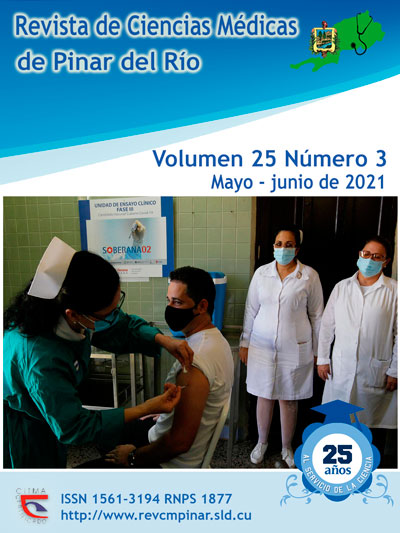Characterization of family functioning with older adults at No 43 Family Doctor’s Office from Turcios Lima University Polyclinic
Keywords:
FAMILY, AGED, SOCIAL CLASS, PRIMARY HEALTH CARE, AGING.Abstract
Introduction: family functioning assessment is an important element in the comprehensive health care of the older adults.
Objective: to characterize family functioning of the older adults belonging to No 43 Family Doctor’s Office from Turcios Lima University Polyclinic between September 2018 and May 2019.
Methods: and observational, descriptive and cross sectional study was conducted in a population of older adults belonging to No 43 Doctor’s Office from Turcios Lima University Polyclinic, Pinar del Rio municipality and province between September 2018 and May 2019. The target group comprised 155 older adults from No 43 Family Doctor’s Office, where giving the informed consent was the only criterion of inclusion to participate in the research, which was accepted by all of the older adults, working with the whole target group, not including a chosen sample.
Results: moderately functional families predominated (46,5 %) and functional ones (23,2 %). The majority of the individuals from 60 to 69 years old (42,9 %) and those from 70 to 79 (50 %), were from a moderately family functioning. Concerning the characteristics of risk of the dimension of socioeconomic and cultural context of family life was the critical family economy the most frequent (29,0 %), overcrowding (23,9 %), and not secure conditions of the houses (12,3%).
Conclusions: moderately functional families predominated, showing increases in alterations of family functioning as the age of older adults increased.
Downloads
References
1. Naranjo Hernández Y, Figueroa Linares M, Cañizares Marín R. Envejecimiento poblacional en Cuba. Gac Méd Espirit [Internet]. 2015 Dic [citado 19/04/2019]; 17(3): 223-233. Disponible en: http://scielo.sld.cu/scielo.php?script=sci_arttext&pid=S1608-89212015000300025&lng=es
2. Bayarre Vea HD, Álvarez Lauzarique ME, Pérez Piñero JS, Almenares Rodríguez K, Rodríguez Cabrera A, Pría Barros MC, Rodríguez Rivera L, Fernández Seco A, Corral Martín A. Enfoques, evolución y afrontamiento del envejecimiento demográfico en Cuba. Rev Panam de Salud Pública [Internet]. 2018 Apr [citado 19/04/2019]; 42: e21 Disponible en: https://www.ncbi.nlm.nih.gov/pmc/articles/PMC6385965/
3. Cámara Argentina de Comercio. Unidad de estudios y proyectos especiales. Informe sobre envejecimiento poblacional, 2018. Disponible en: https://www.cac.com.ar/data/documentos/21_Informe%20sobre%20envejecimiento%20poblacional.pdf
4. Alfonso de Armas M, Rodríguez Gómez G. La evolución demográfica cubana: una mirada desde las teorías transicionales ¿Dónde estamos? Rev Nov Pob. [Internet]. 2016 Dic [citado 19/04/2019]; 21(24): 1-13. Disponible en: http://scielo.sld.cu/scielo.php?script=sci_arttext&pid=S1817-40782016000200001&lng=es&tlng=es.
5. Àlvarez Sintes R, Hernàndez Cabrera G, Bàster Moro JC, Garcìa Nuñez RD. Medicina General Integral. Volumen 1. ECIMED: La Habana. 2014. p 533-54.
6. Rodríguez Calvo MD, Gómez Mendoza C, Guevara de León T, Arribas Llopis A, Duarte Duran Y, Ruiz Álvarez P. Violencia intrafamiliar en el adulto mayor. AMC [Internet]. 2018 Abr [citado 19/04/2019]; 22(2): 204-213. Disponible en: http://scielo.sld.cu/scielo.php?script=sci_arttext&pid=S1025-02552018000200010&lng=es.
7. Serra Valdés M, Cordero López G, Viera García M. El maltrato a los ancianos o el no mejor trato. Realidad y retos. Medisur [Internet]. 2018 Abr [citado 19/04/2019]; 16(2): 233-240. Disponible en: http://scielo.sld.cu/scielo.php?script=sci_arttext&pid=S1727-897X2018000200006&lng=es.
8. Donati PP. Sociología de la Salud. Madrid: Díaz de Santos; 1994. p124
9. Robitschek CH, Kashubeck S. A structural model of parental alcoholism, family functioning, and psychological health: The mediating effects of hardiness and personal growth orientation. Journal of Counseling Psychology. 2015; 46 (2): 159-172.
10. Fajardo Ramos E, Córdoba Andrade L, Enciso Luna JE. Calidad de vida en adultos mayores: reflexiones sobre el contexto colombiano desde el modelo de Schalock y Verdugo. Comunidad y Salud [Internet]. 2016 Dic [citado 19/04/2019]; 14(2): 33-41. Disponible en: http://ve.scielo.org/scielo.php?script=sci_arttext&pid=S1690-32932016000200005&lng=es.
11. Villavicencio-Aguilar C, Romero Morocho M, Criollo Armijos M, Peñaloza Peñaloza W. Discapacidad y familia: Desgaste emocional. Acad. (Asunción) [Internet]. 2018 [citado 19/04/2019]; 5 (1): pp.89-98. Disponible en: http://scielo.iics.una.py/scielo.php?script=sci_arttext&pid=S2414-89382018000100089&lng=es&nrm=iso
12. Troncoso Pantoja C, Soto-López N. Funcionalidad familiar, autovalencia y bienestar psicosocial de adultos mayores. Horiz. Med. [Internet]. 2018 Ene [citado 19/04/2019]; 18(1): 23-28. Disponible en: http://www.scielo.org.pe/scielo.php?script=sci_arttext&pid=S1727-558X2018000100004&lng=es
13. Parra Giordano D. Revolución científica de la salud familiar en Chile. Enfermería Actual de Costa Rica [Internet]. 2016 Dic [citado 19/04/2019]; (31): 243-253. Disponible en: http://www.scielo.sa.cr/scielo.php?script=sci_arttext&pid=S1409-45682016000200243&lng=en
14. Do Livramento Fortes A, Fabelo Roches JR. Funcionamiento familiar de un grupo de familias con un miembro alcohólico residentes en Centro Habana, Cuba. Rev del Hospital Psiquiátrico de La Habana. [Internet]. 2016 [citado 19/04/2019];13(2). Disponible en: http://www.revistahph.sld.cu/2016/Nro%202/funcionamiento%20familiar.html
15. Villafuerte Reinante Jt, Alonso Abatt Y, Alonso Vila Y, Alcaide Guardado Y, Leyva Betancourt I, Arteaga Cuéllar Y. El bienestar y calidad de vida del adulto mayor, un reto para la acción intersectorial. Medisur [Internet]. 2017 Feb [citado 19/04/2019]; 15(1): 85-92. Disponible en: http://scielo.sld.cu/scielo.php?script=sci_arttext&pid=S1727-897X2017000100012&lng=es.
Downloads
Published
How to Cite
Issue
Section
License
Authors who have publications with this journal agree to the following terms: Authors will retain their copyrights and grant the journal the right of first publication of their work, which will be publication of their work, which will be simultaneously subject to the Creative Commons Attribution License (CC-BY-NC 4.0) that allows third parties to share the work as long as its author and first publication in this journal are indicated.
Authors may adopt other non-exclusive license agreements for distribution of the published version of the work (e.g.: deposit it in an institutional telematic archive or publish it in a volume). Likewise, and according to the recommendations of the Medical Sciences Editorial (ECIMED), authors must declare in each article their contribution according to the CRediT taxonomy (contributor roles). This taxonomy includes 14 roles, which can be used to represent the tasks typically performed by contributors in scientific academic production. It should be consulted in monograph) whenever initial publication in this journal is indicated. Authors are allowed and encouraged to disseminate their work through the Internet (e.g., in institutional telematic archives or on their web page) before and during the submission process, which may produce interesting exchanges and increase citations of the published work. (See The effect of open access). https://casrai.org/credit/



